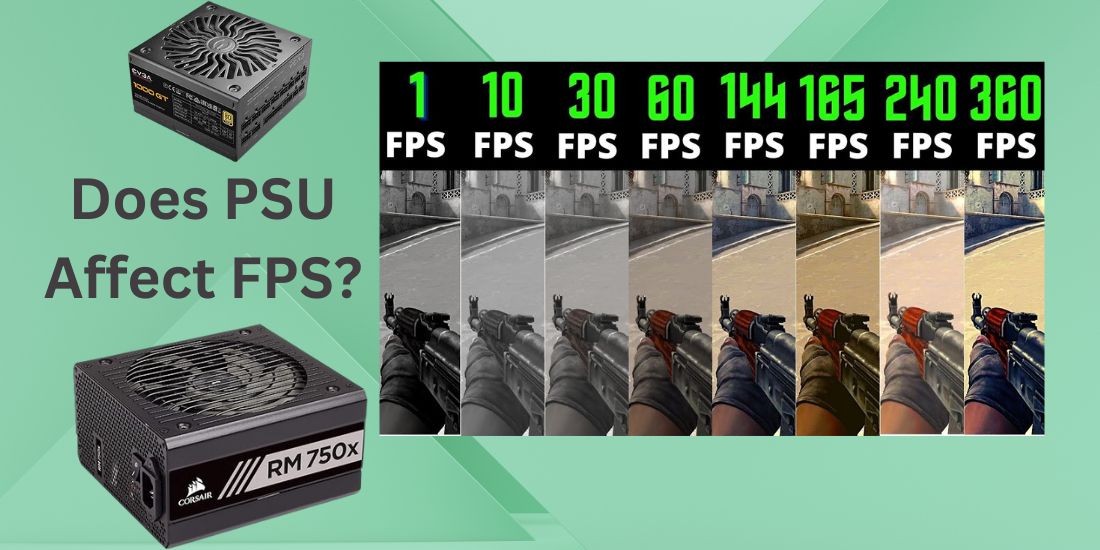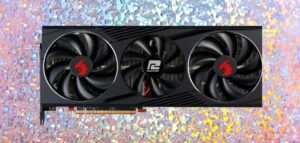Does PSU Affect FPS? Impact on Gaming Performance
The power supply unit, or PSU, is one of the most important yet overlooked components in a gaming PC build. Its main role is to receive power from the wall outlet and convert it to stable, clean DC power that all the other components require to function properly. However, the PSU does more than just power components – it can also significantly impact gameplay performance, specifically frames per second (FPS). Many gamers focus solely on their graphics card and processor when aiming to maximize FPS, without realizing the PSU could also be holding them back. In this article, we will explore does PSU affect FPS? and how factors like wattage, voltage regulation, component quality, compatibility, and cooling can influence FPS. We will also look at some real-world test results. The goal is to bring more attention to this vital component and help gamers better understand how their PSU choice matters for an optimal gaming experience.
The Basics of Power Supply Units:
The power supply unit, or PSU, is the component in your PC that takes AC power from the wall outlet and converts it to several DC voltages that all the other components need to operate. These include +3.3V, +5V, and +12V rails. More powerful components like graphics cards and CPUs mostly run off the +12V rail. The PSU is responsible for delivering clean, stable power to every component smoothly and efficiently. Low-quality PSUs may not adequately regulate voltages, leading to ripples and fluctuations that can cause performance and stability issues. A PSU also needs to have enough power capacity to run all your components under heavy CPU and GPU loads without throttling.
Does Wattage Matter?
One of the most critical aspects of a PSU is its wattage. The wattage rating indicates the maximum power output a PSU can provide to your components. A higher-wattage PSU can support more demanding configurations with power-hungry GPUs and CPUs. While having a PSU with ample wattage is essential to prevent power shortages, it doesn’t necessarily translate to higher FPS. For example, if your gaming rig requires 400 watts of power, using a 1000-watt PSU won’t inherently boost your FPS. The FPS largely depends on the capabilities of your other components and how efficiently they can utilize the provided power.
Can a Bad PSU Cause FPS Drops?
A bad PSU can cause FPS drops by failing to deliver stable and sufficient power to your system. Insufficient power delivery forces the CPU and GPU to throttle their performance, leading to lower clock speeds and reduced FPS. Voltage fluctuations from an unstable PSU can cause sudden frame drops, crashes, or even system reboots, making gameplay inconsistent. Additionally, overheating due to PSU inefficiencies generates excess heat, which can lead to thermal throttling, further degrading performance. If your PSU is low-quality or underpowered, it can indirectly affect FPS by destabilizing your components, causing lag, stuttering, or unexpected shutdowns.
Does PSU Affect Overclocking and FPS?
Overclocking increases the power demands of both the CPU and GPU, requiring a PSU that can provide stable and sufficient power. A high-quality PSU ensures consistent voltage delivery, preventing fluctuations that could cause crashes or FPS drops during overclocked performance. An inadequate PSU may struggle to handle the increased power draw, leading to instability, system reboots, or even hardware damage. Insufficient power can also cause throttling, negating the benefits of overclocking. To maintain smooth FPS and system stability, gamers should invest in a reliable PSU with enough wattage and high efficiency to support overclocked components without risks.
Factors Affecting FPS:
Several factors can influence the relationship between a PSU and FPS:
- Power Consumption: The power consumption of the components in a system can significantly impact FPS. If the PSU is unable to provide sufficient power to the components, it can lead to reduced FPS or even system crashes.
- Voltage Stability: A PSU’s ability to maintain stable voltage levels is crucial for ensuring smooth system performance. If the PSU’s voltage output is unstable, it can cause FPS drops or stuttering.
- Efficiency: A PSU’s efficiency can also impact FPS. A less efficient PSU can generate more heat, which can lead to reduced FPS or system instability.
- Component Compatibility: The compatibility of components with the PSU can also affect FPS. If the PSU is not compatible with certain components, it can lead to reduced FPS or system crashes.
Signs Your PSU is Affecting FPS:
1: Frequent FPS Drops or Stutters – If your CPU or GPU isn’t receiving stable power, it may throttle performance, leading to sudden FPS drops and laggy gameplay.
2: Unexpected System Shutdowns or Restarts – A failing or underpowered PSU may cause your PC to shut down or restart, especially during high-load gaming sessions.
3: Coil Whine and Excessive Noise – Unusual buzzing or whining sounds from the PSU indicate electrical instability, which can lead to power fluctuations and inconsistent performance.
4: System Crashes or Blue Screens (BSODs) – A weak PSU can cause system instability, resulting in frequent crashes, freezing, or error messages.
5: GPU or CPU Running at Lower Speeds – If power delivery is insufficient, your GPU and CPU may automatically reduce clock speeds, leading to lower FPS and sluggish performance.
Choosing the Right PSU for Gaming Performance:
Choosing the right PSU for gaming is crucial for system stability and performance.
1: Wattage recommendations for different builds depend on hardware requirements—basic gaming PCs may need 500W-650W, mid-range builds 650W-750W, and high-end or overclocked systems 850W or more.
2: Importance of headroom in power calculations ensures future upgrades and prevents PSU overload; having at least 20-30% extra wattage above your system’s needs is recommended.
3: Best PSU brands and models for gaming PCs include Corsair RMx, EVGA SuperNOVA, Seasonic Focus GX, and ASUS ROG Strix, known for efficiency, reliability, and stable power delivery for optimal gaming performance.
PSU Troubleshooting for FPS Issues:
PSU troubleshooting for FPS issues helps identify whether an unstable power supply is affecting performance.
- How to test if PSU is causing FPS drops – Monitor for sudden FPS dips, system crashes, or restarts under heavy loads. If FPS improves after switching to a more powerful PSU, the original one was likely the issue.
- Using software to monitor voltage fluctuations – Tools like HWMonitor or HWiNFO can track PSU voltage stability. If voltages fluctuate significantly, your PSU may be struggling.
- Replacing a faulty PSU – If tests confirm instability, upgrade to a high-quality PSU with sufficient wattage and an 80-plus efficiency rating to restore smooth performance.
The Affect Of PSU On FPS:
The power supply unit (PSU) of a computer can have an impact on the overall performance of the system, including its frame rate in games (FPS). However, this impact is indirect and generally only becomes a concern when the power supply is inadequate or malfunctioning. Here are the key points to consider:
1. Efficiency and Voltage Regulation:
The efficiency of a PSU can also affect its impact on gaming performance. Efficient PSUs waste less power as heat, ensuring more of the electricity is delivered to your components. High-efficiency PSUs generally have better voltage regulation, resulting in more stable power delivery. This can lead to smoother gameplay and a more consistent FPS.
When choosing a PSU, it’s advisable to select one with an 80 PLUS certification, which ensures a certain level of efficiency. These PSUs are not only better for the environment but can also improve your gaming experience.
2. Stability and Clean Power:
PSU stability and clean power delivery are essential for consistent FPS in gaming. Instabilities or voltage spikes can lead to crashes, system freezes, and sudden FPS drops. High-quality PSUs often incorporate features like overvoltage protection, undervoltage protection, and short-circuit protection to safeguard your components from power-related issues.
Inadequate or low-quality PSUs might struggle to maintain a stable power supply under load, which can negatively impact your gaming performance. If your PSU can’t provide clean and steady power, your components may not perform optimally, resulting in lower FPS.
3. GPU and PSU Compatibility:
The compatibility between your graphics card and your PSU is another crucial factor in determining your gaming FPS. More powerful GPUs, especially those in the high-end and enthusiast categories, require sufficient power to function at their best. If your PSU can’t deliver the required power, it might cause your GPU to throttle its performance, leading to lower FPS.
In such cases, upgrading your PSU to a model with higher wattage and the necessary PCIe connectors can help unlock the full potential of your GPU. Be sure to check your GPU’s power requirements and compare them to your PSU’s specifications to ensure compatibility.
4. Overclocking and PSU Requirements:
Many gamers love to overclock their CPUs and GPUs to squeeze out every drop of performance. However, overclocking significantly increases power consumption. If you are running an overclocked system, you may need a PSU with even higher wattage to accommodate the increased power demands.
Furthermore, overclocking can lead to increased heat production. A quality PSU with effective cooling can help dissipate this heat, ensuring the power supply unit doesn’t become a bottleneck for your gaming performance.
5. Adequate Power Output:
Adequate power output from a computer’s PSU is crucial for system stability and optimal performance. An underpowered PSU can lead to crashes, freezes, and reduced frame rates in games, as components may not receive the necessary power. It can also damage hardware over time and limit overclocking potential.
To ensure adequate power output, calculate the total power requirements of your components and select a reputable PSU with a wattage rating that comfortably exceeds these needs, allowing for headroom and future upgrades.
6. Protection Features:
The protection features of a power supply unit (PSU) are essential for safeguarding your computer’s components and overall system stability. Over-voltage protection, under-voltage protection, and over-current protection help prevent power-related issues, such as voltage fluctuations or surges, which can lead to hardware damage. Short-circuit protection prevents electrical shorts that might damage the PSU or other components.
While these features primarily protect your hardware and data, their indirect impact on FPS lies in ensuring system reliability. By preventing sudden power-related failures or component damage, these protections maintain a consistent gaming experience without unexpected crashes or freezes, ultimately preserving your frame rates and the overall quality of your gaming sessions.
Additional Considerations:
- PSU Wattage: The wattage of the PSU can also impact FPS. A PSU with a higher wattage can provide more power to the components, which can lead to improved FPS.
- PSU Efficiency: The efficiency of the PSU can also impact FPS. A more efficient PSU can generate less heat, which can lead to improved FPS.
- Component Upgrades: Upgrading components can also impact FPS. If the PSU is unable to provide sufficient power to the upgraded components, it can lead to reduced FPS or system crashes.
- System Configuration: The system configuration can also impact FPS. If the system is configured incorrectly, it can lead to reduced FPS or system instability.
Conclusion
In summary, while a PSU may not directly affect FPS, it plays a crucial role in maintaining system stability, providing clean power, and supporting high-demand components like graphics cards. The wattage, efficiency, and compatibility of your PSU are all important considerations when optimizing your gaming rig. To ensure that your gaming experience is as smooth and high-performing as possible, choose a high-quality PSU that meets your system’s power requirements, provides stable and clean power, and is compatible with your components. By doing so, you’ll be one step closer to achieving those coveted high FPS and an immersive gaming experience.
FAQs
Q: Does a PSU wattage increase boost gaming performance?
A: No, it won’t enhance performance; it should match your system’s needs to prevent issues.
Q: Can a low-quality PSU harm my gaming experience?
A: Yes, it can lead to instability, crashes, and reduced FPS.
Q: How does PSU efficiency affect gaming?
A: Efficiency indirectly contributes to stable power delivery, leading to smoother gameplay.
Q: Is PSU compatibility important for GPUs?
A: Yes, it ensures your PSU provides sufficient power, and connectors, and fits your GPU.
Q: What’s the impact of PSU on overclocking and FPS?
A: PSU quality and wattage matter for overclocking; insufficient power can affect FPS and system stability.
Last Updated on 29 January 2025 by Ansa Imran

Ansa Imran, a writer, excels in creating insightful content about technology and gaming. Her articles, known for their clarity and depth, help demystify complex tech topics for a broad audience. Ansa’s work showcases her passion for the latest tech trends and her ability to engage readers with informative, well-researched pieces.







